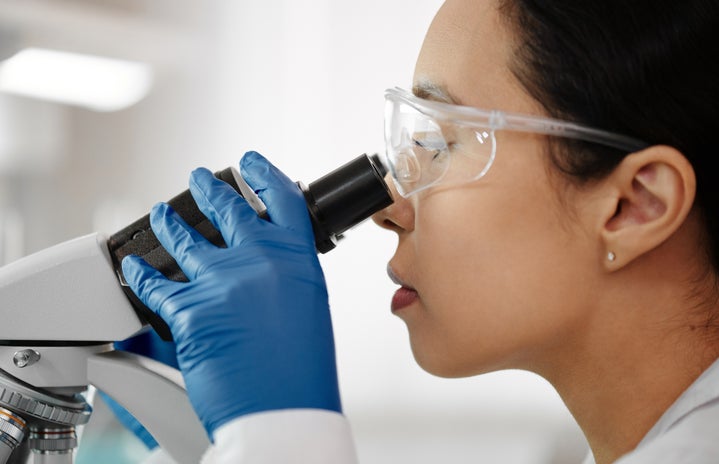People who are not in grad school are usually shocked to hear that I went straight from graduating with an undergraduate degree to starting a Ph.D. program. It’s common to think that you have to have a master’s degree to get into a Ph.D. program, however that’s not quite true. While it may make the transition into a Ph.D. program easier by having a master’s, more time is lost. My field of study is in materials science and engineering, and typically a master’s degree takes about two years. While I wish I had the experience of a master’s degree, I wasn’t willing to wait another two years to get a Ph.D., especially since I knew I would eventually get a Ph.D.
I would like to be a professor eventually after working in the engineering industry for a while, but to achieve these goals I need a Ph.D. Also, Ph.D. students in most programs are able to “master out” and graduate without a Ph.D. and get a master’s degree instead. That’s an option available for me too, but I did not want to add more years of waiting to start my career fully. That’s why I looked into getting a Ph.D. first.
It should be said that the transition between a bachelor’s and a Ph.D. is by no means easy. I jumped from having a normal undergrad life,attending classes and extracurriculars, to having all that and doing at least twenty hours of research a week. Twenty hours a week doesn’t sound like a lot, but it’s like a full-time job now when you combine it with classes.
When you start a Ph.D. program, you are typically given what’s called a research assistantship (if you aren’t, then that’s a whole other discussion). A research assistantship is basically a job. You have to sign a contract that says you will work X amount of hours in research a week (twenty hours in my case) in addition to taking a certain amount of credit hours (nine for me). The incentive is that you get paid a monthly stipend, tuition covered, and get health insurance (not all schools do this). It’s really a weird thing. You’re still a student, but you’re working, and part of your job is to be a student.
I’m grateful to have this opportunity, especially now with the coronavirus pandemic where many engineering companies had a hiring freeze by the time I graduated in May. I’m still working to find the right balance between research and my classes. I’m only taking two classes with assignments (the others being research credit and seminars), but they are overwhelming with the research commitment. However, that’s expected when you join a Ph.D. program.
In undergrad, at the University of Florida, I was fortunate to not be required to do research. I did it as a choice, and also as a way to get used to research early. While I was engaged in research, I never realized how intensive it was to be a graduate research assistant. It truly takes up your time. When I’m not focusing on classes, I have to be focusing on research. I have to read more journals, make progress towards a skill, and be productive so I don’t fall behind. It’s funny because I never had to schedule free time during undergrad, but now I have to. I also have to be way more accountable for my time. I don’t have set hours to do research, I just have to get it done. This leaves me with a lot more freedom than I’m used to
Honestly, I thought I was going to be alone during this. I really thought it was going to be a competitive nature between all of us grad students. My undergrad was extremely competitive. We tried getting the same internships, getting on our professor’s good sides for letters of recommendation (the trick is don’t try too hard, because it shouldn’t be forced), the best grades, and it sucked. Now that I’m in the door, it’s not as bad. From what I can tell from being a few months in, people aren’t out to get you. We already have at least one degree, so there’s always that safety net. Especially in my research group, there is an understanding that we want to see each other succeed. It’s very supportive and I’m able to find guidance when I need it.
Another weird thing is how old and seasoned I feel. I currently live with an undergrad, and Her Campus at Texas A&M is mostly undergrads, so it’s a different vibe because I have already been through undergrad. Coming here to TAMU for grad school is also interesting because I am learning about all the traditions as I go. I didn’t get as comprehensive of an orientation that undergrads do, and I don’t get to explore campus because all of my classes are online and I have an office desk on campus, eliminating the need to find study places. I feel especially old when I hear people talk about TikToks and zoomer things. It’s weird because I’m barely older than most undergrads, but I have already been through what they have.
There are times I wish I didn’t start grad school in a pandemic, but it honestly doesn’t seem that different from pre-COVID times. The main difference is that there’s a lot more work from home now, you can’t do grad student socials, and there are capacity limits in rooms. In the grand scheme of things, it’s not a lot. Hopefully things get better soon so that I can have a more typical grad student experience, but I’ll make the most of what I have instead of complaining about it.
The transition isn’t easy and was unexpected, to say the least. There are times I wish I could have had a gradual transition instead of diving in headfirst. However, I know this is what’s best for me. I want to be done with my education as soon as I can so that I can start my career in materials science and engineering fully. This isn’t for everyone, though, and I implore people to think carefully about their plans. No matter what, do what it takes to make yourself feel fulfilled, and like you’re growing as a person.


